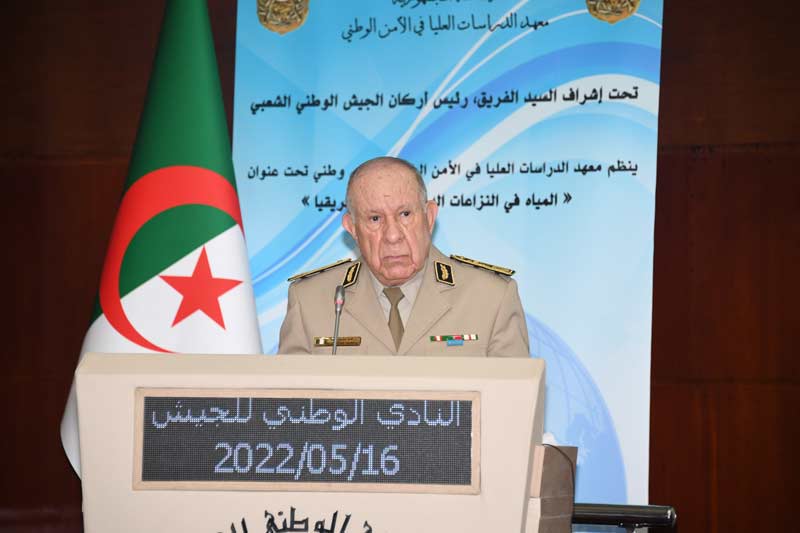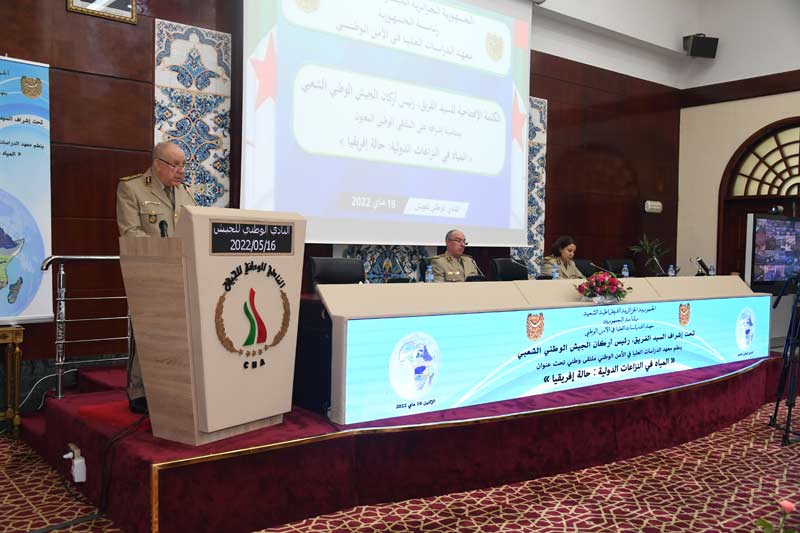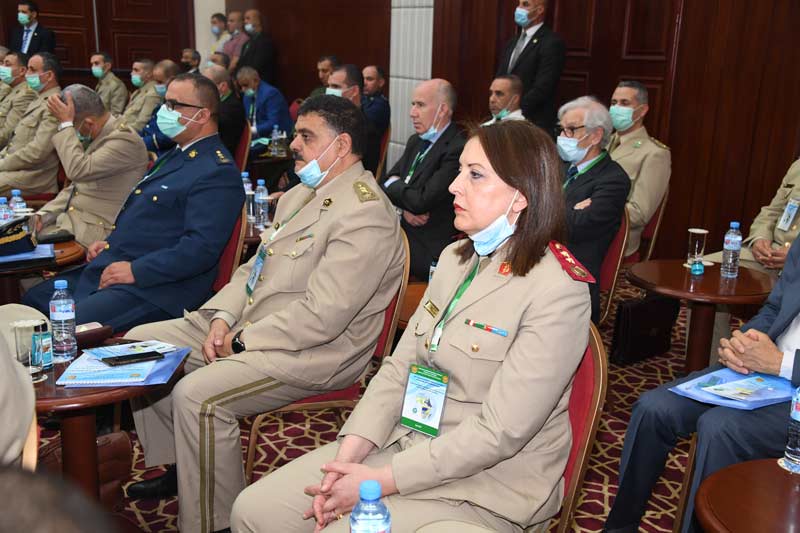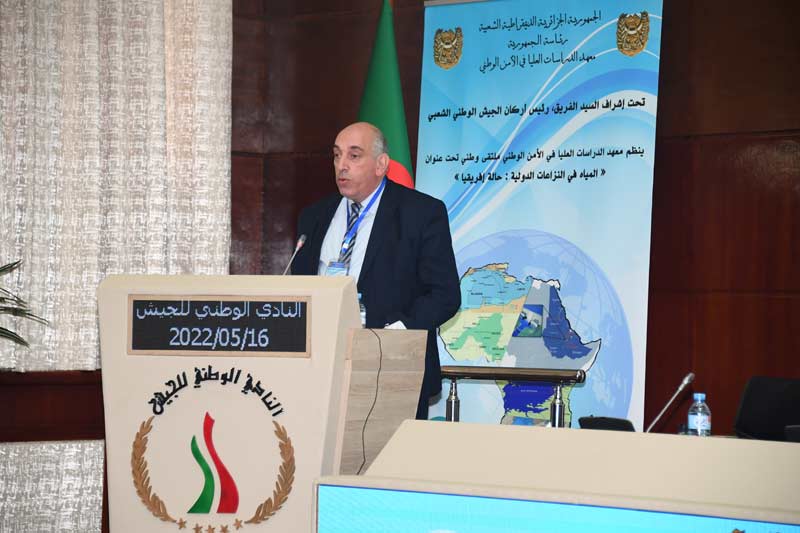Official Statement of MND
16th May 2022
Lieutenant General Saïd CHANEGRIHA, Chief of Staff of PNA, presides over the opening of the conference work entitled: "Water at the heart of international conflicts: the case of Africa"
In order to sharing objective analyzes and finding practical solutions to deal with the security threats caused by conflicts over water resources in Africa, the Institute for Higher Studies of National Security organized, this Monday, 16th May 2022 at the Army’s National Circle in Béni Messous, a national conference entitled: "Water at the heart of international conflicts: the case of Africa".
The opening of the conference work was chaired by the Lieutenant General Saïd CHANEGRIHA, Chief of Staff of People's National Army, in the presence of members of the government, the Advisor to the President of the Republic, in charge of affairs related to defense and security, the Director General of the National Institute for Global Strategy Studies, as well as general officers of the Ministry of National Defense and the General Staff of People's National Army.

At the beginning, the Lieutenant General delivered an opening speech through which he emphasized the importance of water resources with regard to its functional link with economic development, public health and food security, while inviting State institutions to formulate reflections on the matter, aiming to meet the multidimensional requirements of national security:


“Water is a source of life and development. It is also a tool of pressure and bargaining as evidenced by many international landscapes, and a means of fueling the internal instability of States in situations of water stress, food insecurity and inability to create a national system, solid and durable in the matter.
Water also represents an intrinsic element of the national security of States, which is why States are working to develop integrated designs, even forward-looking strategies, in order to ensure the rational exploitation of water capable of satisfying survival needs and to ensure a decent life for current and future generations.
This is where the role of the scientific and research institutions of People's National Army and other state institutions comes in, through the organization of such scientific activities, which should lead to the development of reflections and of ideas, able to meet the requirements of national security, in all its military, economic, health, societal and environmental dimensions".
The Lieutenant General underlined that understanding the security and economic developments and threats related to water is more than necessary, in order to adopt and implement a national water security strategy, and to solve the related conflicts at the level of the African continent:
“In this wake, this meeting aims to shed light on developments and security, economic and societal threats related to water, while focusing on African depth in particular.
Understanding, therefore, these developments and these threats is more than necessary, in order to adopt and implement a national water security strategy, which will allow us to be in phase with these developments and to face their possible threats, in particular those related to the peaceful and consensual resolution of conflicts around water in Africa, without the interference of foreign parties and in such a way as to guarantee the achievement of the objectives of the African agenda of 2023”.
For his part, the Director General of Interior Security emphasized the need to put in place scientific and functional mechanisms to ensure our water security as it is one of the vital dimensions of our national security:


“The objective of this conference is to study and to discuss the evolution of the reality of conflicts around water in order to build realistic and prospective conceptions of the mapping of internal conflicts and between African States. Participants are also expected to present data and proposals that can be used to strengthen our national water security and to formulate reflections on the best approaches to consolidate our common water security.”
In addition, the Director of the Institute of Higher Studies on National Security highlighted the interest of scientific and research corps, of which the Institute is one of the pillars, in continuing efforts to offer academic support to state institutions.


"Scientific and research corps, of which the Institute is one of the pillars, must ensure total commitment and continue the diligent work for quality academic support for State institutions, in the perspective of guaranteeing sustainable development and bringing together the factors of growth and its mechanisms consolidating the structural stability of the State and its national security”.
Subsequently, lectures were presented by professors and expert researchers on the vital importance of water resources in the world in general and in the African continent in particular, and on the approaches to be adopted and the strategies to be implemented, in order to achieve technical solutions making it possible to predict the threats caused by the depletion of this resource and to thwart them with the appropriate means, while taking into account the geostrategic, economic, societal, legal and environmental dimensions of these threats. These interventions were followed by debates led by experts and executives who presented ideas and reflections on this question, contributing to the enrichment of the work and the recommendations of this conference.


The opening of the conference work was chaired by the Lieutenant General Saïd CHANEGRIHA, Chief of Staff of People's National Army, in the presence of members of the government, the Advisor to the President of the Republic, in charge of affairs related to defense and security, the Director General of the National Institute for Global Strategy Studies, as well as general officers of the Ministry of National Defense and the General Staff of People's National Army.

At the beginning, the Lieutenant General delivered an opening speech through which he emphasized the importance of water resources with regard to its functional link with economic development, public health and food security, while inviting State institutions to formulate reflections on the matter, aiming to meet the multidimensional requirements of national security:


“Water is a source of life and development. It is also a tool of pressure and bargaining as evidenced by many international landscapes, and a means of fueling the internal instability of States in situations of water stress, food insecurity and inability to create a national system, solid and durable in the matter.
Water also represents an intrinsic element of the national security of States, which is why States are working to develop integrated designs, even forward-looking strategies, in order to ensure the rational exploitation of water capable of satisfying survival needs and to ensure a decent life for current and future generations.
This is where the role of the scientific and research institutions of People's National Army and other state institutions comes in, through the organization of such scientific activities, which should lead to the development of reflections and of ideas, able to meet the requirements of national security, in all its military, economic, health, societal and environmental dimensions".
The Lieutenant General underlined that understanding the security and economic developments and threats related to water is more than necessary, in order to adopt and implement a national water security strategy, and to solve the related conflicts at the level of the African continent:
“In this wake, this meeting aims to shed light on developments and security, economic and societal threats related to water, while focusing on African depth in particular.
Understanding, therefore, these developments and these threats is more than necessary, in order to adopt and implement a national water security strategy, which will allow us to be in phase with these developments and to face their possible threats, in particular those related to the peaceful and consensual resolution of conflicts around water in Africa, without the interference of foreign parties and in such a way as to guarantee the achievement of the objectives of the African agenda of 2023”.
For his part, the Director General of Interior Security emphasized the need to put in place scientific and functional mechanisms to ensure our water security as it is one of the vital dimensions of our national security:


“The objective of this conference is to study and to discuss the evolution of the reality of conflicts around water in order to build realistic and prospective conceptions of the mapping of internal conflicts and between African States. Participants are also expected to present data and proposals that can be used to strengthen our national water security and to formulate reflections on the best approaches to consolidate our common water security.”
In addition, the Director of the Institute of Higher Studies on National Security highlighted the interest of scientific and research corps, of which the Institute is one of the pillars, in continuing efforts to offer academic support to state institutions.


"Scientific and research corps, of which the Institute is one of the pillars, must ensure total commitment and continue the diligent work for quality academic support for State institutions, in the perspective of guaranteeing sustainable development and bringing together the factors of growth and its mechanisms consolidating the structural stability of the State and its national security”.
Subsequently, lectures were presented by professors and expert researchers on the vital importance of water resources in the world in general and in the African continent in particular, and on the approaches to be adopted and the strategies to be implemented, in order to achieve technical solutions making it possible to predict the threats caused by the depletion of this resource and to thwart them with the appropriate means, while taking into account the geostrategic, economic, societal, legal and environmental dimensions of these threats. These interventions were followed by debates led by experts and executives who presented ideas and reflections on this question, contributing to the enrichment of the work and the recommendations of this conference.







